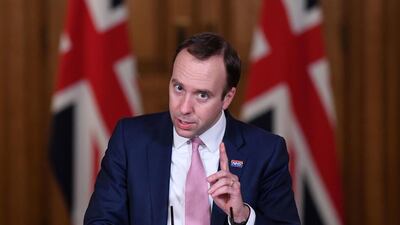Despite Britain looking to roll out a coronavirus vaccine as early as December, health minister Matt Hancock warned on Friday that in the best case scenario, most of the inoculations would come next year.
British health officials are putting plans in place to set up mass vaccination centres in football stadiums and smaller venues in primary care networks for at-risk groups.
The indoor arena at Pride Park football stadium in Derby is one confirmed vaccination centre.
A mass recruitment drive for healthcare staff is also due to take place shortly, the Health Service Journal reported.
It is understood that the government hopes to vaccinate as many as one million people per day at peak deployment.
Speaking at a press conference in Downing Street on Friday, Mr Hancock said: "If the regulators approve a vaccine, we will be ready to start the vaccinations next month with the bulk of the rollout in the new year.
"We are heading in the right direction, but there is still a long way to go. Coronavirus remains a danger right now, so we must keep doing all that we know to blunt the force of this virus."
He warned that even "in the best case scenario", the bulk of the vaccine rollout would be next year, and it would still take a few months to get the inoculations to vulnerable groups.
Mr Hancock said earlier that it would be run “in parallel” with a flu programme and that the law had been changed to allow more people to deliver the shot.
He told Sky News that “normally, 15 million people are vaccinated against flu. This year it will be 30 million – the biggest number in history.
"We hope that we will also have a Covid vaccination programme alongside that. It will be a huge effort, but I know that the NHS is up for it."
Mr Hancock said there were "encouraging signs" with both the Pfizer and Oxford vaccines but cautioned "nothing is guaranteed yet".
He added that peak deployment would likely take place next year.
Vaccine rollout 'no easy feat'
Dr Nigel Watson, a Hampshire physician who is working on vaccination plans, confirmed reports that firefighters and soldiers would be recruited for the rollout.
"This is the biggest vaccination programme in history and therefore we're going to need to expand the workforce over the winter period," he told BBC Radio 4's Today programme.
“We’re already extended as it is.”
Peter Openshaw, a professor at Imperial College London, said that the logistical challenges involved with rolling out the vaccine would be immense.
He said the Pfizer vaccine, which needs to be stored at minus 75 degrees, could be kept at hospitals and delivered once a week.
“This is no easy feat,” he said.
Meanwhile, a leading scientist has suggested coronavirus infections may be starting to level out in the UK.
Neil Ferguson, also a professor at Imperial College London, told the Guardian that infection rates appear to be "plateauing" and gradually declining.
The epidemiologist called for the lockdown to be extended to stop infection rates rebounding.
He said: “A halving of infection prevalence over the four weeks would be a positive result.”
A further 22,915 people tested positive for the virus, with 501 deaths on Thursday, according to the government’s coronavirus dashboard.
There were 163,061 infections over the past week, down 2.4 per cent from the week before.
Another 2,847 deaths were also registered in the past week, an increase of 1.4 per cent compared to the previous week.
Mr Hancock said the infection rate was showing "encouraging signs" of flattening but that it was too early to tell whether this would mean a near-normal Christmas.
He said: "There are encouraging signs that the number of cases is starting to flatten and that the lockdown that we brought in earlier this month is working.
"It of course won't be like a normal Christmas, there will have to be rules in place, but we hope that they'll allow for a bit more of that normal Christmas that people really look forward to."
A senior health official has said England will face nearly a month of lockdown to stop Covid-19 infections soaring, if it takes the five days being mooted by officials, where restrictions will be relaxed to allow people to spend time with their families over Christmas.
Speaking at the press conference on Friday, deputy chief medical officer for England Jonathan Van-Tam said that there was no "magic number" for how many days it would take to ease coronavirus restrictions at Christmas.
He added that it was "a dual responsibility" of the government to implement informed rules to allow for "a sensible Christmas", but it was also the public's responsibility to follow those rules.












